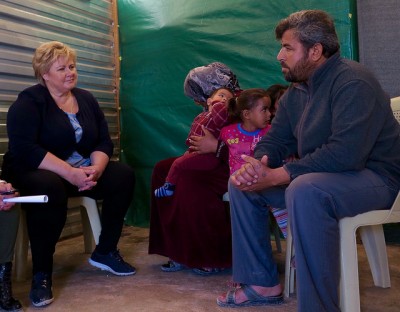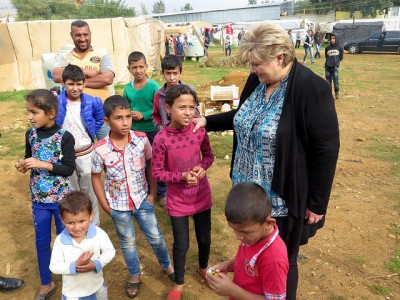As another record number of asylum seekers streamed over Norway’s border to Russia last week, Prime Minister Erna Solberg was visiting refugees not within her own country but in Lebanon and Jordan. And as her government struggles to contain the refugee crisis at home, and cuts foreign aid to pay for accommodating asylum seekers now in Norway, Solberg was urging other countries to contribute more aid for refugees around and still in Syria.

“It makes a strong impression to meet people who have fled war and most of what they owned,” Solberg said after her surprise trip to Lebanon and Jordan over the weekend. The trip had been kept secret for security reasons but Solberg posed for photos both at the Zaatari refugee camp in northern Jordan and at Syrian refugee settlements in Lebanon.
The trip sent some mixed signals, though. Solberg’s call for more aid to refugee camps comes as her own government controversially cuts its foreign aid budget to pay for the new refugee costs at home. Another 1,113 asylum seekers arrived in Northern Norway last week, 126 of them pushing or riding their mandatory bicycles over the border on Sunday alone.
On Wednesday the state will open a new “arrival center” in Kirkenes, aimed at more efficiently dealing with the refugee influx. The government has resorted to trying to scare refugees into not heading for the Norwegian border, after diplomatic efforts to get Russian authorities to stem the flow have failed so far. After the Norwegian government ministers resisted calls to close the border, they are considering other calls to send asylum seekers who don’t qualify for protection out of the country within 48 hours. And they may not be sent back to Russia but back to their homelands, be it Afghanistan, Iraq or elsewhere. Syrian refugees have the best chances of being granted asylum, but four have been sent back to Russia where they already had been granted protection, and one Afghan refugee returned to Russia voluntarily.

The Solberg government’s new scare tactics didn’t seem to jibe with all the sympathy she was showing refugees in Lebanon and Jordan, but that’s because the people she was meeting there have fled Syria and there’s no chance of them returning anytime soon. “It makes a special impression to see children with an uncertain future ahead of them because of their difficult circumstances,” Solberg said.
She stressed that the Syrian refugees have “great need for aid,” while the huge numbers of them pose “considerable challenges” to Syria’s neighbouring countries to continue providing basic services like schooling and health care to their own populations. “The world must take greater responsibility and give more support to refugees within Syria and nearby areas,” Solberg said.
Her trip was part of follow-up work on the Norwegian initiative for a donor conference for Syria. Norway, along with Germany, Kuwait, Great Britain and the UN, will host the conference in early 2016. And as her government battles to get its own budget accepted for aid to refugees in Norway, Solberg arranged for another NOK 80 million to the UN’s refugee work in and around Syria.
Meanwhile, she urged her own government coalition’s parties to stop quarreling, put party politics aside and agree on a means of solving the crisis. On Monday there were signs her Conservative Party had come to terms with the Progress Party on the refugee budget and tightening benefits for asylum seekers, but the minority coalition still must seek support in the Parliament. The Progress Party’s tougher line seems to have won more support among the public, as it jumped in new public opinion polls published Saturday. After falling into the single digits just a few months ago, the Progress Party could claim 16.6 percent in a new poll conducted for newspaper Klassekampen and Nationen, its highest level in more than two years.
newsinenglish.no/Nina Berglund

